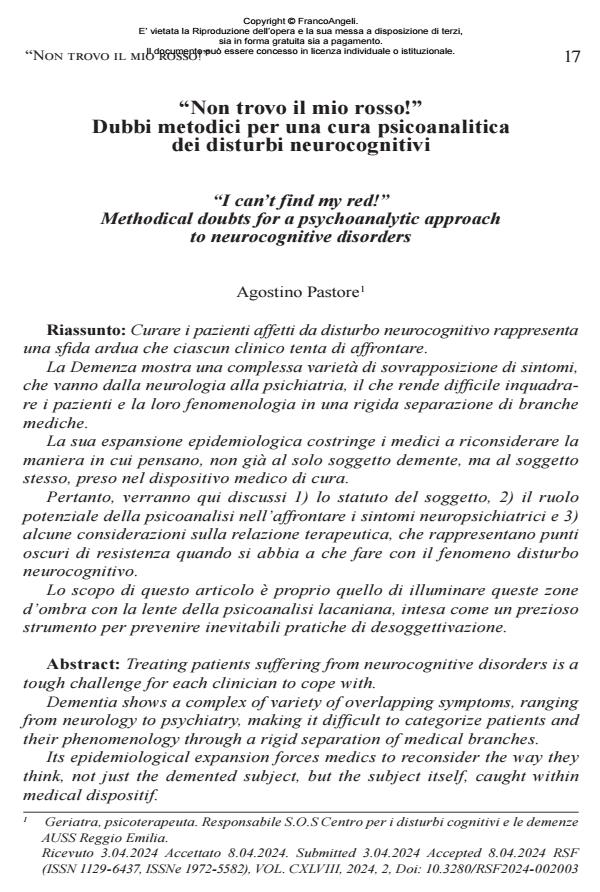“Non trovo il mio rosso!” Dubbi metodici per una cura psicoanalitica dei disturbi neurocognitivi
Titolo Rivista RIVISTA SPERIMENTALE DI FRENIATRIA
Autori/Curatori Agostino Pastore
Anno di pubblicazione 2024 Fascicolo 2024/2
Lingua Italiano Numero pagine 25 P. 17-41 Dimensione file 304 KB
DOI 10.3280/RSF2024-002003
Il DOI è il codice a barre della proprietà intellettuale: per saperne di più
clicca qui
Qui sotto puoi vedere in anteprima la prima pagina di questo articolo.
Se questo articolo ti interessa, lo puoi acquistare (e scaricare in formato pdf) seguendo le facili indicazioni per acquistare il download credit. Acquista Download Credits per scaricare questo Articolo in formato PDF

FrancoAngeli è membro della Publishers International Linking Association, Inc (PILA)associazione indipendente e non profit per facilitare (attraverso i servizi tecnologici implementati da CrossRef.org) l’accesso degli studiosi ai contenuti digitali nelle pubblicazioni professionali e scientifiche
Curare i pazienti affetti da disturbo neurocognitivo rappresenta una sfida ardua che ciascun clinico tenta di affrontare. La Demenza mostra una complessa varietà di sovrapposizione di sintomi, che vanno dalla neurologia alla psichiatria, il che rende difficile inquadrare i pazienti e la loro fenomenologia in una rigida separazione di branche mediche. La sua espansione epidemiologica costringe i medici a riconsiderare la maniera in cui pensano, non già al solo soggetto demente, ma al soggetto stesso, preso nel dispositivo medico di cura. Pertanto, verranno qui discussi 1) lo statuto del soggetto, 2) il ruolo potenziale della psicoanalisi nell’affrontare i sintomi neuropsichiatrici e 3) alcune considerazioni sulla relazione terapeutica, che rappresentano punti oscuri di resistenza quando si abbia a che fare con il fenomeno disturbo neurocognitivo. Lo scopo di questo articolo è proprio quello di illuminare queste zone d’ombra con la lente della psicoanalisi lacaniana, intesa come un prezioso strumento per prevenire inevitabili pratiche di desoggettivazione.
Parole chiave:demenza, Malattia di Alzheimer, Distrubi neurocognitivi, disturbo comportamentale lieve (MBI), sintomi comportamentali e psicologici correlati alle demenze (BPSD), psicoanalisi, Lacan, soggetto, soggettivazione, transfert, desoggettivazione.
Agostino Pastore, “Non trovo il mio rosso!” Dubbi metodici per una cura psicoanalitica dei disturbi neurocognitivi in "RIVISTA SPERIMENTALE DI FRENIATRIA" 2/2024, pp 17-41, DOI: 10.3280/RSF2024-002003